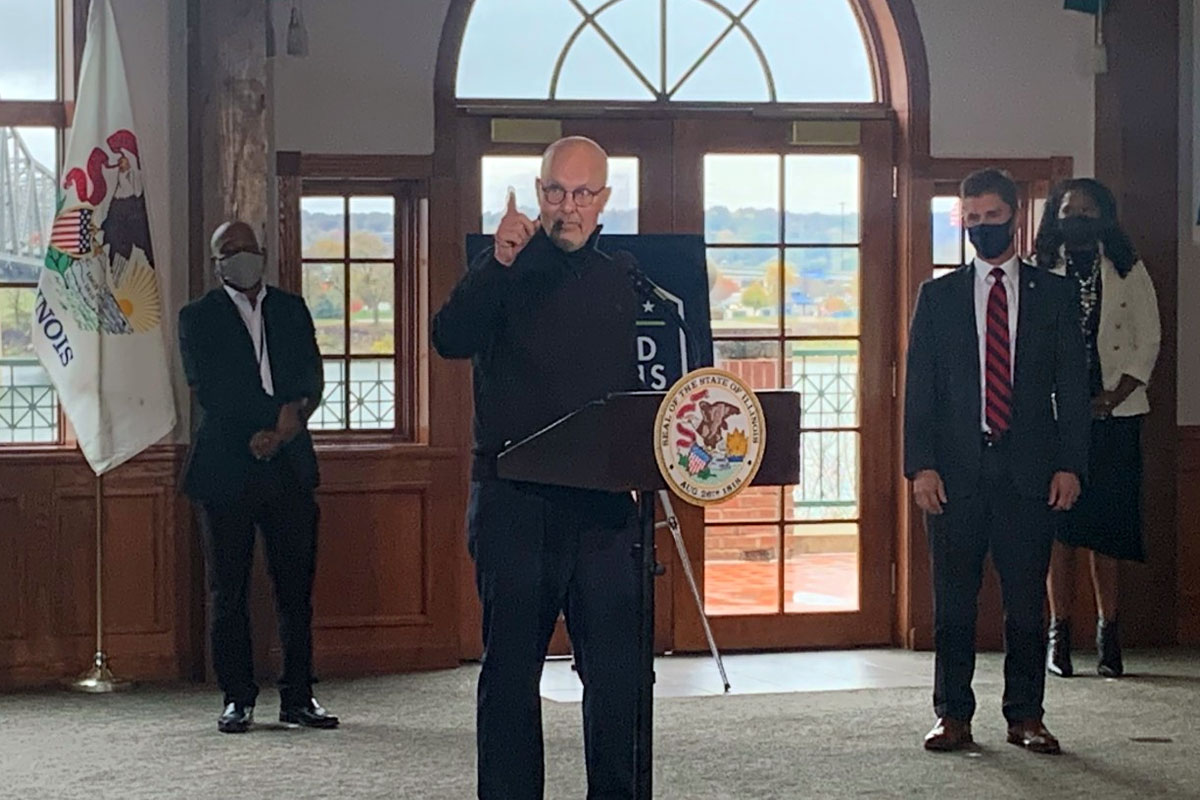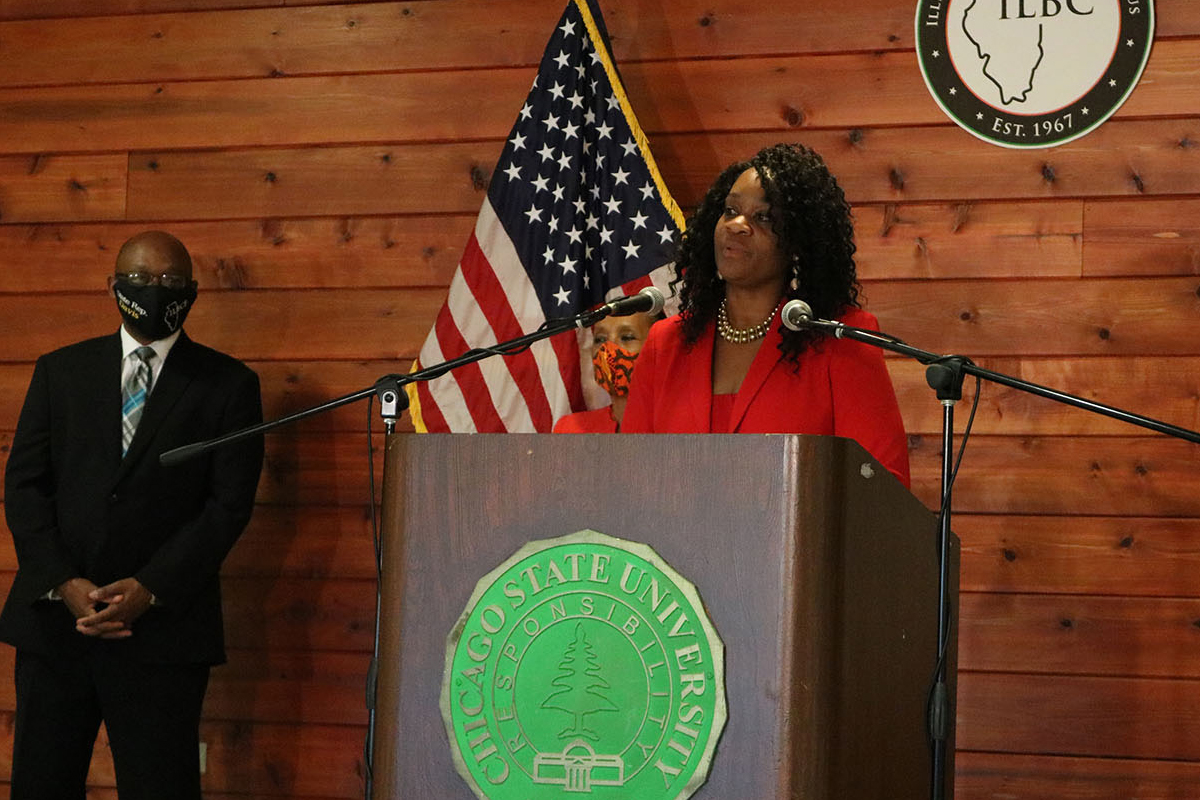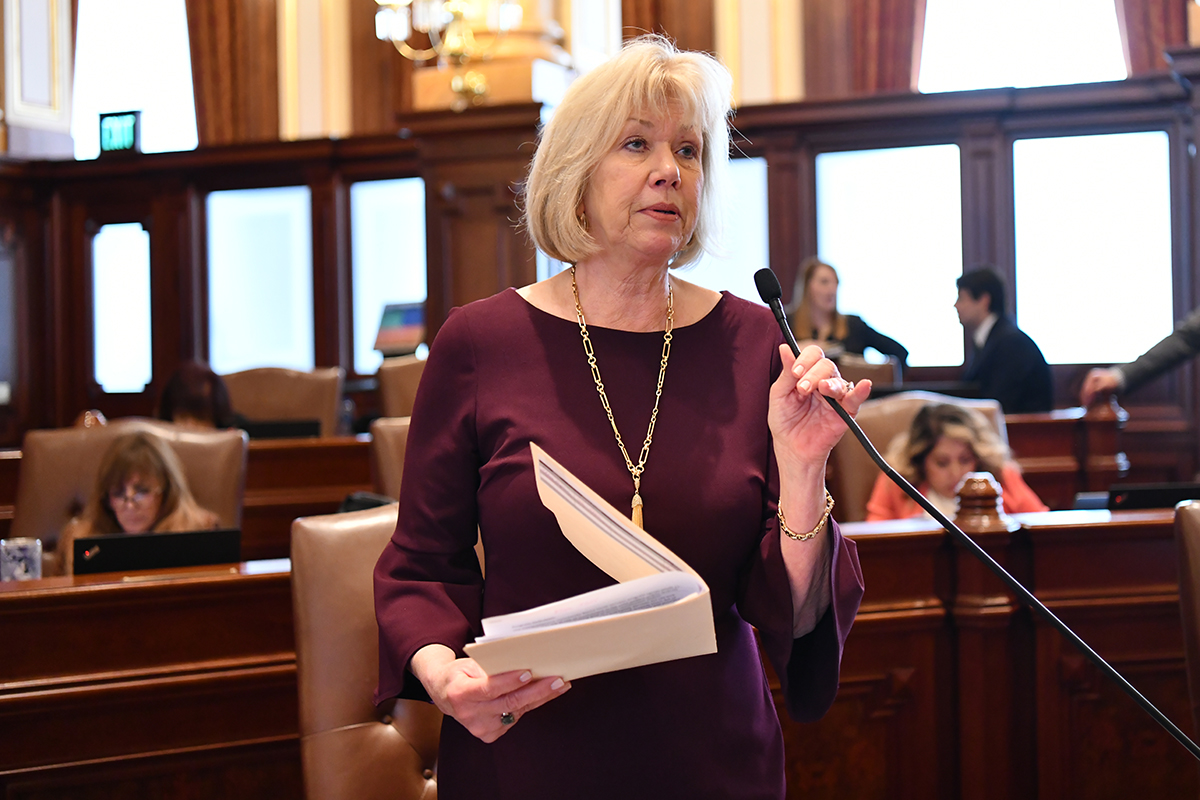- Details
- Category: Senator Dave Koehler News
 PEORIA – State Senator Dave Koehler (D-Peoria), joined with Gov. JB Pritzker and officials from the Illinois Department of Transportation to mark the completion of the Murray Baker Bridge’s renovation project Monday.
PEORIA – State Senator Dave Koehler (D-Peoria), joined with Gov. JB Pritzker and officials from the Illinois Department of Transportation to mark the completion of the Murray Baker Bridge’s renovation project Monday.
“The revitalization of the Murray Baker Bridge is a long time coming," Koehler said. "The peace of mind that comes with regular maintenance of our roads and bridges cannot be understated and the newly installed lights add to the already magnificent Peoria skyline."
Read more: Koehler highlights completion of the Murray Baker Bridge
- Details
- Category: Senator Patricia Van Pelt News
 CHICAGO – To analyze the issues in mental health and substance abuse, Senate Public Health Chair Patricia Van Pelt, Executive Chair Mattie Hunter and Health and Human Services Chair Julie Morrison will lead a joint Senate committee hearing Monday morning.
CHICAGO – To analyze the issues in mental health and substance abuse, Senate Public Health Chair Patricia Van Pelt, Executive Chair Mattie Hunter and Health and Human Services Chair Julie Morrison will lead a joint Senate committee hearing Monday morning.
“Mental health is a sector of public health that is often overlooked in Black communities,” Van Pelt said. “It is important that we shine a light on the trauma-enforced issues and start the conversation around trauma-informed care.”
“Advancing solutions in behavioral health is one of my biggest priorities,” Hunter said. “Nothing matters if we don’t prioritize our mental wellbeing. It’s crucial that we promote mental health awareness, especially in the midst of the pandemic.”
Read more: Van Pelt, Hunter and Morrison to host Senate hearing on behavioral health
- Details
- Category: Senator Mattie Hunter News
 CHICAGO – Earlier this year, Trinity Health announced it would close Mercy Hospital and Medical Center by 2021, which has been widely opposed by community members, health care officials and many legislators – including State Senator Mattie Hunter (D-Chicago). Those opposed hosted a press conference Friday morning, and urged that Mercy stay open, even if the ownership must change.
CHICAGO – Earlier this year, Trinity Health announced it would close Mercy Hospital and Medical Center by 2021, which has been widely opposed by community members, health care officials and many legislators – including State Senator Mattie Hunter (D-Chicago). Those opposed hosted a press conference Friday morning, and urged that Mercy stay open, even if the ownership must change.
“Closing Mercy Hospital due to financial costs, as has been the justification when other safety nets have been shuttered, is not a solution,” Hunter said. ”The financial issues faced in our health care system are multi-faceted, and will require a different approach. Re-evaluating nonprofits tax exempt status may be a part of that approach.”
Read more: Hunter: Closing Mercy won’t solve financial issues, it will kill people
- Details
- Category: ILBC Committee Roundup

The Illinois Legislative Black Caucus held a number of hearings throughout the week to dive further into racial disparities across all sectors of life and to continue to build upon its four-pillar legislative agenda to eliminate systemic racism ahead of the fall veto session.
On Monday, Senate Public Health Chair Patricia Van Pelt (D-Chicago), Executive Chair Mattie Hunter (D-Chicago) and Health and Human Services Chair Julie Morrison (D-Lake Forest) lead a joint hearing to discuss the disparities in access to health care across racial and socioeconomic lines.
“The time it takes to reach the hospital can determine whether someone lives or dies,” Hunter said. “Safety net hospitals are the only option some Black and Brown people have, yet they are extremely underfunded and continue to be closed down. “
During the hearing, physicians and hospital executives advocated for the need of safety net hospitals, which provide patients who need emergency care with options that are nearby and affordable. However, due to lack of revenue, many of these safety net hospitals that residents depend on are closing down, including Mercy Hospital, which is expected to close in 2021.
Read more: Black Caucus Committee Roundup for week of Oct. 19
- Details
- Category: Senator Patrick Joyce News
 PARK FOREST – State Senator Patrick Joyce (D-Essex) joins Secretary of State and State Librarian Jesse White to invite students in grades 4-12 to enter a statewide reading and writing competition known as “Letters About Literature in Illinois,” offered by the Illinois State Library’s Illinois Center for the Book.
PARK FOREST – State Senator Patrick Joyce (D-Essex) joins Secretary of State and State Librarian Jesse White to invite students in grades 4-12 to enter a statewide reading and writing competition known as “Letters About Literature in Illinois,” offered by the Illinois State Library’s Illinois Center for the Book.
“Literature is a powerful tool, and this is a wonderful opportunity for students to share their love for reading,” said Joyce. “I encourage students to participate in the competition and submit an entry.”
Read more: Joyce invites student readers to enter “Letters About Literature in Illinois” competition
- Details
- Category: Senator Robert Martwick News
 CHICAGO – The Illinois Environmental Council (IEC) named State Senator Robert Martwick (D-Chicago) a Lifetime Environmental Champion for his exceptional voting record on environmental protection and sustainability legislation.
CHICAGO – The Illinois Environmental Council (IEC) named State Senator Robert Martwick (D-Chicago) a Lifetime Environmental Champion for his exceptional voting record on environmental protection and sustainability legislation.
“Throughout my career, I’ve made it a priority to work toward cleaner air and water, tackle climate change and protect our open spaces. It is an honor to be recognized by the Illinois Environmental Council for these efforts,” said Martwick. “I look forward to continuing to work with them to protect our environment and the health and safety of our communities.”
Read more: Martwick honored as Environmental Champion for lifetime pro-environment voting record
- Details
- Category: Senator Cristina Castro News
 ELGIN – With flu season in full swing, it’s important to take precautions to protect yourself and your family. In recognition of this, State Senator Cristina Castro (D-Elgin) is sponsoring a flu shot clinic in Hanover Park next month.
ELGIN – With flu season in full swing, it’s important to take precautions to protect yourself and your family. In recognition of this, State Senator Cristina Castro (D-Elgin) is sponsoring a flu shot clinic in Hanover Park next month.
“Under normal circumstances, it would be a good idea to get a flu shot so that you and your loved ones can stay healthy throughout the flu season,” Castro said. “But this year, when flu season coincides with a global pandemic, the importance is even greater. We can’t let one dangerous disease let us get complacent about another, so I encourage everyone to sign up and get a flu shot.”
Read more: Castro-sponsored flu shot clinic coming to Hanover Park in November
- Details
- Category: Senator Julie A. Morrison News
 DEERFIELD – Nearly two months after thousands of children under the Department of Children and Family Service’s care were transitioned to a new health care program, State Senator Julie Morrison (D-Lake Forest) led a hearing to discuss how the transition went and what changes still need to be made to the program.
DEERFIELD – Nearly two months after thousands of children under the Department of Children and Family Service’s care were transitioned to a new health care program, State Senator Julie Morrison (D-Lake Forest) led a hearing to discuss how the transition went and what changes still need to be made to the program.
“While I’m pleased thousands of children have received better care, more must be done to make sure every child in the DCFS system receives adequate health care regardless of ZIP code or family background,” Morrison said. “Foster families have already sacrificed so much to take care of our state’s most vulnerable children. They shouldn’t have to consider uprooting their families to find local, quality care.”
Read more: Morrison: Every child in the DCFS system deserves the same care, regardless of ZIP code
More Articles …
Page 613 of 768













 © 2026 Illinois Senate Democratic Caucus
© 2026 Illinois Senate Democratic Caucus